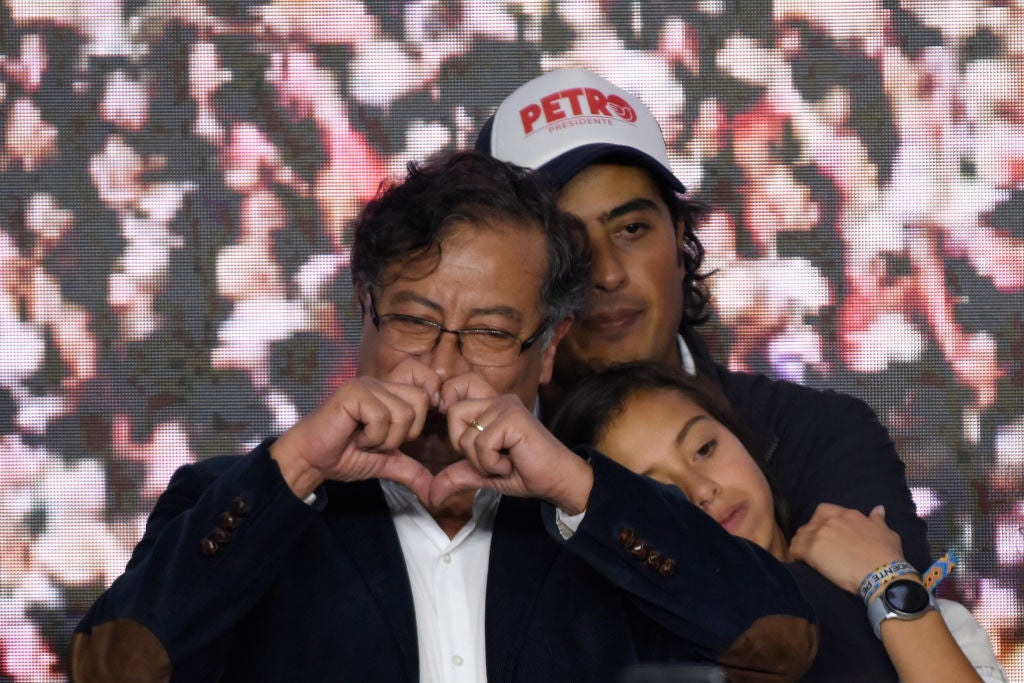
On Sunday 29 May, Colombia headed to the polls to vote in the first round of a general election that is bound to become even more divisive, given that it resulted in two polarising candidates going into the second round.
Following the first round, the choice is now between left-wing Gustavo Petro – the front runner leading up to the vote – and right-wing populist Rodolfo Hernández – a construction magnate who has been likened to Donald Trump and is known as the ‘king of TikTok‘ due to him doing most of his political campaigning on social media.

Discover B2B Marketing That Performs
Combine business intelligence and editorial excellence to reach engaged professionals across 36 leading media platforms.
The main opponent to Petro initially was Federico Gutiérrez, the former mayor of Colombia’s second-largest city – Medellín – and a close ally of the government of incumbent President Iván Duque, who could not run again as presidents are banned from completing more than one four-year term.
However, when the first-round votes were counted, Petro led the way with 40.3%, and Hernández beat Gutiérrez into second place with 28.2% of the vote.
If Petro wins in the second round on 19 June, he will become the first left-wing president of Colombia, and his running mate, Francia Márquez, will also make history as the first black female vice-president.
Meanwhile, experts do not forecast major changes to Colombia’s foreign direct investment (FDI)-friendly climate, even though his opponents have attempted to use Petro’s so-called radical left-wing politics against him.

US Tariffs are shifting - will you react or anticipate?
Don’t let policy changes catch you off guard. Stay proactive with real-time data and expert analysis.
By GlobalDataPetro’s radical past might not be a threat to FDI
According to Leonardo Vivas, a former fellow at the Carr Centre for Human Rights Policy and lecturer on Latin America at Emerson College in Massachusetts, US, changes to Colombia’s FDI regulations are not going to be the first items on the agenda of either candidate.
However, he points out that Petro has announced his intention to distance Colombia from the oil economy, which could affect FDI levels in the country. According to the UN Conference on Trade and Development, the extraction and processing of oil, coke and petroleum makes up 40% of Colombia’s total FDI.
Vivas believes that if Petro wins, FDI will not be very much affected because Colombia has been improving its business environment consistently for foreign investors, especially since the 2016 Peace Accord, which ended five decades of conflict with the Revolutionary Armed Forces of Colombia.
“Even if Petro wins the election, he will have a very divided Congress; both the Senate and the House will be very divided, and his portion of both houses would be approximately one-third or even less of that,” says Vivas, reinforcing the unlikeliness of major changes to Colombia’s attractiveness to foreign investors.
He adds that Petro’s politics are not as extreme left as they were at the beginning of his political career, which started off in the guerrilla group ’19th of April Movement’ when he was 17. “Despite the fact that he started his political career as very left wing-oriented, he has been drawn to the centre over the years and lately has been trying to reinforce the difference of his position to people such as Nicolás Maduro [in Venezuela] or the Castros [in Cuba], who are kind of a very extreme left,” explains Vivas.
In terms of the economy, Petro is more of a moderate, explains Vivas, who “is not going to nationalise companies”. He believes that the reforms, should Petro win, will be more social than economic.
What issues will dominate Colombia’s presidential run-off?
If Petro isn’t Colombia’s new president come mid-June, then it will be Hernández, who Sergio Guzmán, director of Colombia Risk Analysis, says has a fair chance of winning as he is poised to take the voters from the other right-wing candidate, Gutiérrez.
With Hernández being a businessman, investors “can essentially breathe a sigh of relief” at the prospect of him emerging victorious, says Guzmán.
The next couple of weeks before the second round of the elections will define exactly what the candidates’ positions are, and one of the issues that might distinguish them is Colombia’s relationship with Venezuela, says Vivas.
Petro is in favour of normalising relations between the two countries, “if that is possible”, says Vivas, and Hernández is also looking to re-establish diplomatic relations. “But [Hernández] is not saying that he wants to be buddies [with Venezuela],” adds Vivas, noting the distinction in the language used by the candidates on this topic. Both candidates will be wary of the fact that the US is one of the largest investors in Colombia, so any thawing of relations could have a knock-on economic impact.
Away from geopolitics, problems related to drug cartel-related violence are still scarring Colombia, and Vivas expects security to be another key issue for both candidates.
Results-wise, Vivas is anticipating a very close second round, given that Petro may struggle to go much higher than the 40% of the vote he picked up in the first round, while Hernández looks well poised to secure the bulk of the right-wing votes that had gone to Gutiérrez. Neither candidate, however, looks likely to set back Colombia’s impressive progress since its 2016 peace deal.





